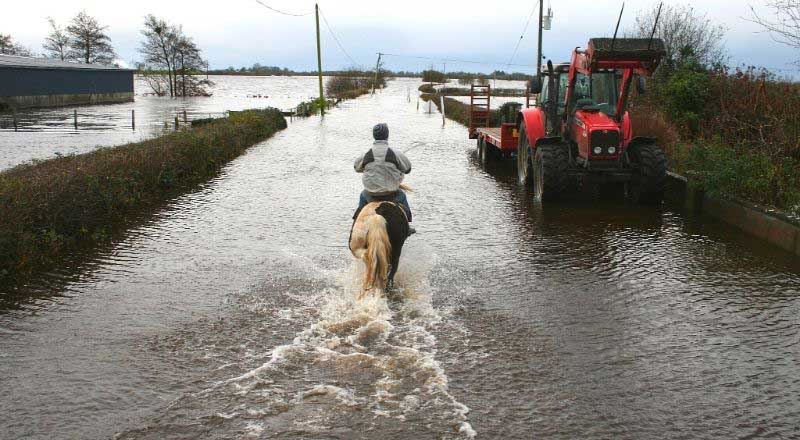
Adapting to a changing climate: How can we build resilience?
18 November 2020We must build resilience to a range of challenges, including that of climate change. Individuals play a critical role in our combined path to a resilient economy and society. Find out more in this blog by Dr Olga M Grant.
By Dr Olga M Grant
Department of the Environment, Climate and Communications.
Current Opinion Series (number 9) of the RIA Climate Change and Environmental Science Committee
Globally, our climate is changing, and the rate of change is increasing.[1] Climate change is already ‘locked-in’ to the climate system—due to past and current levels of greenhouse gas emissions—and will continue even if international efforts to reduce these emissions are successful. The impacts of human-induced global warming of 1°C above pre-industrial temperatures are already being felt, in the intensity and frequency of some weather extremes.[2] Climate-related risks to health, livelihoods, food security, water supply, human security and economic growth are projected to increase with global warming of 1.5°C. These impacts will be more severe if warming reaches 2°C. The Global Commission on Adaptation estimates that without adaptation, climate change may depress growth in global agriculture yields by as much as 30% by 2050; increase the number of people who lack sufficient water at least one month per year from 3.6 billion today to over 5 billion by 2050; and push more than 100 million people in developing countries below the poverty line by 2030.[3]
While some of these impacts may seem remote, observations show that Ireland’s climate is also changing, at a scale and rate consistent with regional and global trends.[4]. (See Ray McGrath’s opinion piece on retrieving and using weather observations to better understand our climate). Recent climate projections for Irelandshow how the magnitude of future climate change will vary considerably across the country.[5] The most immediate risks to Ireland from climate change are mainly those associated with changes in extremes, for example changes in the frequency or intensity of storms or of heavy rainfall leading to flooding.
In 2020 alone, we have seen forest fires in Australia early in the year, and in the western states of the USA and in Brazil in more recent months. As highlighted in this Current Opinion Series, in Ireland a dry spring resulted in considerable soil moisture deficits and risk of drought in June. Two months later, and again in October, flooding hit the headlines. Storm Alex caused floods and landslides in France and Italy early in October. While it is still often difficult to attribute specific weather events to climate change, these examples indicate the extent of the damage that extreme weather conditions cause. We need to prepare for an increased frequency of such events.
Climate adaptation policy: international to local
The Paris Agreement of 2015 established a long-term goal to increase the ability to adapt to, and foster resilience to, the adverse impacts of climate change. Strengthening resilience and adaptive capacity is also a target in Sustainable Development Goal 13: Climate Action.
European policy on adaptation to climate change is set out in the EU Adaptation Strategy. Following public consultation this year, a new EU Adaptation Strategy will be published early in 2021, as part of the EU Green Deal.
An analysis of Ireland’s preparedness for climate change adaptation was conducted by the European Commission in 2018. The commission found that Ireland had made good progress in terms of coordinating adaptation policy nationally and putting in place systems to assess current and projected climate change, impacts and vulnerability. On the other hand, it indicated insufficient progress in the identification of adaptation options; in the monitoring and evaluation of adaptation activities; in mainstreaming adaptation across key national policy instruments; and in the development of systems to monitor and report on climate change adaptation, including adaptation-related expenditure. Since this assessment, considerable advances have been made; in 2018, Ireland’s first statutory National Adaptation Framework was published.[6]
The National Adaptation Framework sets out Ireland’s policy to ensure local authorities, regions, and key sectors can assess the main risks and vulnerabilities of climate change, implement climate resilience actions, and ensure climate adaptation considerations are mainstreamed into all local, regional and national policy. With twelve priority areas and a wide range of supporting objectives, it has led to a number of developments in addressing how Ireland responds to climate change. This includes the launch of sectoral adaptation plans designed to build resilience across the following sectors: seafood, agriculture, forestry, biodiversity, built and archeological heritage, water quality and water services infrastructure, flood-risk management, health, transport, energy and gas networks, and communications networks. Also, each council of the 31 local authorities in the country adopted an adaptation strategy for its administrative area. Each strategy includes an assessment of risks as a result of climate change to that sector or geographical area.[7] For example:
- Water quality: Heavy rainfall may lead to flooding, which in turn will lead to mobilisation of pollutants, reducing water quality. On the other hand, dry phases will result in low river flow, with reduced dilution of contaminants in water bodies. That in turn will reduce water quality. Dry weather may also lead to the drying of peatlands, resulting in the reduction of natural filtration of pollutants—leading, again, to reduced water quality.
- Water services infrastructure: During heavy rainfall, increased surface and sewer flooding may lead to pollution, and also to interruptions to water and wastewater services. When rainfall is limited, conversely, flow will be reduced, leading to reduced availability of water resources. Hot weather will increase the demand for water, which could lead to water shortages.
The local authority plans and strategies also identify actions to address such risks. For example, solutions to risks posed to the water quality and water services infrastructure sector include:
- improving treatment capacity and network functions for water services infrastructure;
- water-resource planning and conservation; and
- including climate measures in monitoring programmes and research.
Adaptation actions can be grey—relating to technical or engineering solutions; green—relating to nature-based solutions; or soft—for example, influencing policy or behaviour.
The Climate Change Advisory Council, in its latest Annual Review, recommends that all of us—individuals, businesses, local and central government, etc.—need to be involved in building resilience to climate change. Researchers can play a key role in addressing gaps in our knowledge as to how best to develop resilience. The National Adaptation Framework outlines some areas where improved understanding is still needed, such as
- impacts under different emissions scenarios;
- impacts on the marine and coastal environment; and
- financial costs of climate impacts and of adaptation responses.
Some of these areas are being or will be addressed through national research programmes. In addition, ‘Adaptation to climate change including societal transformation’ will be one of the five mission areas in the EU’s next research and innovation programme, Horizon Europe.
Both in Ireland and internationally, Covid-19 has highlighted the fragility of our society and economy when faced with disturbance. As we address this public health crisis, we have become more aware of the need to ‘build back better’. We must build resilience to a range of challenges, including that of climate change. Individuals play a critical role in our combined path to a resilient economy and society. Individual actions on the issue of climate change adaptation can include implementing temporary flood-protection measures for homes and businesses; reducing water use during drought; protecting our health during a heat wave; or helping to protect natural areas for river water to disperse, for instance by participating in community conservation projects. We can start now to consider whether our choices will hold up in a changing climate.
[1] World Meteorological Organisation (2019), United in Science: High-level synthesis report of latest climate science information convened by the Science Advisory Group of the UN Climate Summit 2019.
[2] IPCC (2018), ‘Summary for policymakers’. In: Global warming of 1.5°C. An IPCC Special Report on the impacts of global warming of 1.5°C above pre-industrial levels and related greenhouse gas emission pathways, in the context of strengthening the global response to the threat of climate change, sustainable development, and efforts to eradicate poverty.
[3] Global Commission on Adaptation (2019), Adapt now: a global call for leadership on climate resilience. Washington, DC: World Resources Institute.
[4] Department of Communications, Climate Action and Environment (2018), National Adaptation Framework.
[5] Nolan, P. and Flanagan, J. (2020), High-resolution climate projections for Ireland: a multi-model ensemble approach. EPA Research Report no. 339.
[6] These plans and strategies are available from www.climateireland.ie.
Interview with Dr Grant
When did you join the RIA Climate Change and Environmental Science Committee?
I joined this committee in 2018: it has been a great opportunity to keep in touch with policy-relevant research across the wide range of disciplines that address climate change and the environmental sciences.
What is your area of research expertise and where are you based?
I developed research expertise in the area of plant responses to the environment, including, for example, how plants respond to limited water availability, and how we can use this understanding to improve irrigation-use efficiency or select plant varieties that will be more tolerant of future growing conditions. More recently, however, working in the Department of the Environment, Climate and Communications, I have applied my broad environmental sciences background to understanding the range of issues that the government needs to address in relation to the environment and climate change.
What do you think is the single most pressing environmental issue facing Ireland?
I was asked this many years ago, as an Environmental Sciences undergraduate! I said ‘attitude’. At the time, I felt that we perceived Ireland to be a green country, where it wasn’t necessary to worry too much about the environment. Ireland has changed a lot since then, but I still think attitudes need to change in order to address the climate change and biodiversity crises.
In your opinion, what are some of the most compelling solutions to this issue?
Adaptation to climate change is a good example of how to solve the issue of complacency to environmental issues. First, the relevant sectors need to understand the impacts of climate change. Then, they need to plan what needs to be done in order to address these issues. And finally, the plan needs to be implemented, monitored and revised as new understanding emerges. So: understand, plan, implement, monitor and revise.
What advice do you have for individuals to tackle this environmental issue?
There is now abundant information available regarding the environment and climate change. I would advise that individuals seek out reputable resources, become informed and work out how they can change their own behaviour to help protect the environment, conserve biodiversity, reduce greenhouse gas emissions and adapt to a changing climate.
Photo by Irish Defence Forces at https://www.flickr.com/people/42787928@N06
Blog post content and statements are proprietary to the authors. Each author represents only themself and their own opinion



